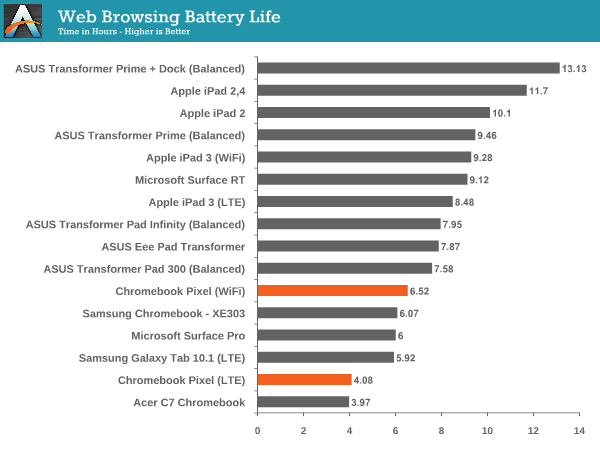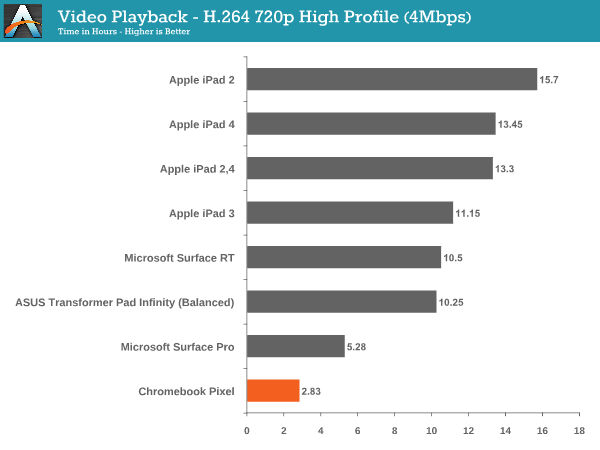The Chromebook Pixel Review
by Jason Inofuentes on May 31, 2013 8:00 AM ESTBattery Life
Like our performance tests, our battery test borrows more from our tablet reviews than it does our notebook reviews. The inability to run any native software here limits us to... well, to the browser. So, we start with our web browsing test. The idea is straightforward, we’re cycling through four websites, disabling any background services that might interrupt the process and setting the display to our customary 200 nits. This test is designed to challenge ARM cores, giving them just enough time to render a page and go back to sleep before asking for the next page. This isn’t as challenging for Ivy Bridge silicon, which is able to complete the render and rush to sleep much faster, which we know can yield better average power consumption and better battery life. The other factor that affects battery life in this scenario is that display. With over 4 million pixels to light up, the panel is going to chew through power a lot faster than something less dense. Only one way to found out how it goes, though.

The Pixel ends up eking out 6.5 hours on WiFi, besting the Surface Pro by a bit, but it’s much more a wash, the larger battery’s added capacity is exhausted by the more power hungry screen. On LTE the Pixel puts up 4.08 hours of stamina; enough for a few hours at a cafe, but not an all day untethered session.
Our video test loops a 720p video encoded with H.264 with an average bit rate of 4 Mbps with the screen once again set at our traditional 200 nits. Running this test on a Chromebook is a little different than any other platform. The video player does exist somewhat outside the browser, but the software is written in HTML5. Hardware accelerated decode of H.264 content is a staple of Chrome and HTML5, though. Right?

This is really awful, and surprising performance. The best explanation we can muster is that an issue in the video player is preventing this file from utilizing hardware decode resources. In that case, decoding and then scaling the video to match the display might tax the system enough to cause this sort of poor performance. If that's the case then an update could drastically impove this score; until then, though, the Pixel does not make for a good media companion on the road.
Ultimately, what we’re really seeing in these charts, is that the rush to sleep advantage Ivy Bridge has over ARM is not enough to overcome ARM’s power envelope. The Pixel’s silicon is a 17W part. Even the most power hungry ARM SoCs in this table clock in below 5W. That’s a deficit that’s going to be hard to overcome... for now. There’s a very real reason to suggest caution in buying anything with Ivy Bridge right now, Anand made the same case in his Surface Pro review. A Haswell alternative in the future should exhibit better battery life, with equivalent performance. There’s also the Atom refresh (Silvermont) to consider; a quad-core Baytrail part could provide plenty of performance while drawing a lot less power than the Ivy Bridge part we’re using today.
Is the Pixel going to let you sit in the park all day, working on the great American novel? No, it won’t. Heck, it might not get you through a longish movie during a flight. If untethered stamina is a prime concern, look elsewhere than really any of the Chromebooks. If you’re near an outlet most of the time, this performance just isn’t great. When you design a thin, modern notebook, you have to make compromises, and in this case, battery life was one of them.










74 Comments
View All Comments
Bobs_Your_Uncle - Monday, June 3, 2013 - link
A good review. Also, I thoroughly enjoyed reading various drafts of various segments in the "Why Not Android" segment!seapeople - Monday, June 3, 2013 - link
Certainly this is a review, that, upon revealing itself to me on my computer, it exerts a judgement of thought immediately as it just sits there. Beyond reproach due to a quirky optimism and ostensibly modulated restraint, I find it best to reflect upon this review only as an afterthought, being intertwined betwixt moments of time, as though one instantaneous occurrence is immediately transcended by the jolt of the next occurrence, and occurring not simultaneously, but nearly so as to appear so. Therefore, I follow this review with one of my own, a review of the review, that being so similar in style, serves through ironic prose to indicate the true nature of that which we have been so wonderfully graced with via the AnandTech homepage.wffurr - Wednesday, June 5, 2013 - link
For web development, just hit ctrl-alt-t and then ssh into your server and edit there with vim. Problem solved. Chromebooks are perfect for LAMP/Java/Node/etc. web development. Not so much with the .NET web stack. If my work had an OpenVPN or IPSec endpoint instead of Juniper SSL VPN, I would use one instead of a Macbook.rabbit212 - Thursday, August 1, 2013 - link
I purchased a chromebook pixel and it's touchscreen didn't work. The customer service was horrible. I was told that I needed to wait a week for a replacement chromebook pixel LTE. I was forced to wait 48 hours for an RMA due to the Nexus 7 launch. I will never purchase another Google Play device. Apple is more responsive and get's the concept of customer satisfaction.